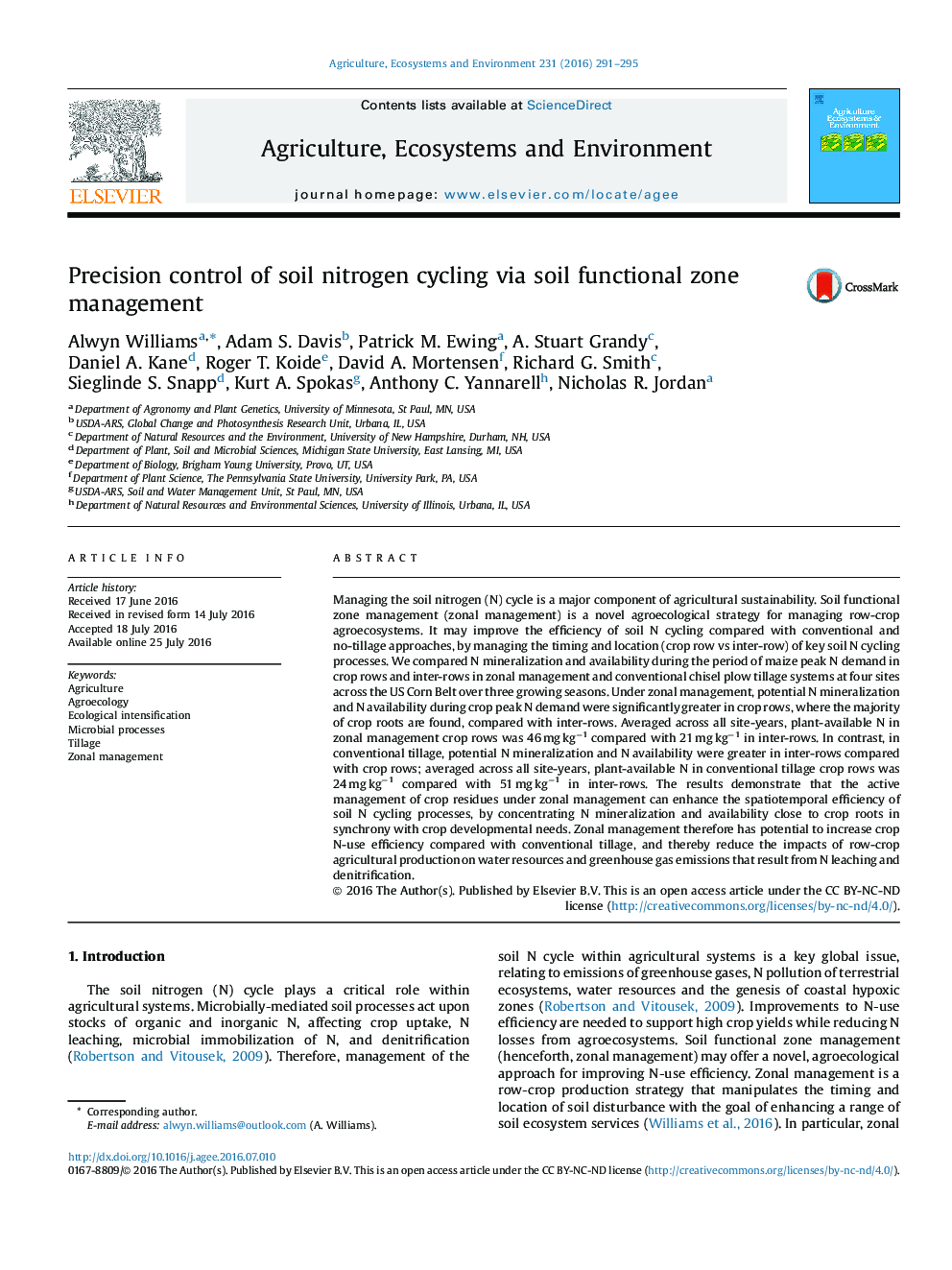| کد مقاله | کد نشریه | سال انتشار | مقاله انگلیسی | نسخه تمام متن |
|---|---|---|---|---|
| 8487365 | 1552021 | 2016 | 5 صفحه PDF | دانلود رایگان |
عنوان انگلیسی مقاله ISI
Precision control of soil nitrogen cycling via soil functional zone management
ترجمه فارسی عنوان
کنترل دقیق از نیتروژن خاک دوچرخه سواری از طریق مدیریت عملکرد منطقه خاک
دانلود مقاله + سفارش ترجمه
دانلود مقاله ISI انگلیسی
رایگان برای ایرانیان
کلمات کلیدی
کشاورزی، کشاورزی تشدید زیست محیطی، فرآیندهای میکروبی، کشت و زرع، مدیریت زون،
موضوعات مرتبط
علوم زیستی و بیوفناوری
علوم کشاورزی و بیولوژیک
علوم زراعت و اصلاح نباتات
چکیده انگلیسی
Managing the soil nitrogen (N) cycle is a major component of agricultural sustainability. Soil functional zone management (zonal management) is a novel agroecological strategy for managing row-crop agroecosystems. It may improve the efficiency of soil N cycling compared with conventional and no-tillage approaches, by managing the timing and location (crop row vs inter-row) of key soil N cycling processes. We compared N mineralization and availability during the period of maize peak N demand in crop rows and inter-rows in zonal management and conventional chisel plow tillage systems at four sites across the US Corn Belt over three growing seasons. Under zonal management, potential N mineralization and N availability during crop peak N demand were significantly greater in crop rows, where the majority of crop roots are found, compared with inter-rows. Averaged across all site-years, plant-available N in zonal management crop rows was 46 mg kgâ1 compared with 21 mg kgâ1 in inter-rows. In contrast, in conventional tillage, potential N mineralization and N availability were greater in inter-rows compared with crop rows; averaged across all site-years, plant-available N in conventional tillage crop rows was 24 mg kgâ1 compared with 51 mg kgâ1 in inter-rows. The results demonstrate that the active management of crop residues under zonal management can enhance the spatiotemporal efficiency of soil N cycling processes, by concentrating N mineralization and availability close to crop roots in synchrony with crop developmental needs. Zonal management therefore has potential to increase crop N-use efficiency compared with conventional tillage, and thereby reduce the impacts of row-crop agricultural production on water resources and greenhouse gas emissions that result from N leaching and denitrification.
ناشر
Database: Elsevier - ScienceDirect (ساینس دایرکت)
Journal: Agriculture, Ecosystems & Environment - Volume 231, 1 September 2016, Pages 291-295
Journal: Agriculture, Ecosystems & Environment - Volume 231, 1 September 2016, Pages 291-295
نویسندگان
Alwyn Williams, Adam S. Davis, Patrick M. Ewing, A. Stuart Grandy, Daniel A. Kane, Roger T. Koide, David A. Mortensen, Richard G. Smith, Sieglinde S. Snapp, Kurt A. Spokas, Anthony C. Yannarell, Nicholas R. Jordan,
